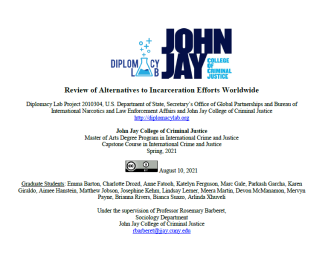Review of Alternatives to Incarceration Efforts Worldwide

Substance use disorders are reoccurring chronic, often relapsing disease that affect the brain and should be treated within the public health arena similar to other diseases such as diabetes and heart disease. This understanding, however, does not easily find its way into public or social policy.
Persons suffering from untreated substance use disorders most often end up in the criminal justice system because of criminal activity related to their disease and the need to support their addiction. The criminal justice system becomes the repository of individuals with substance use disorders and that system may be the first-place people suffering from the disease enter treatment. Therefore, opportunities for treatment interventions occur along the justice continuum from arrest to prosecution to sentencing to incarceration to release. Creating systematic treatment interventions which offer treatment in lieu of incarceration or further prosecution results in reduced criminal activity and increases opportunities for recovery.
In Spring 2021, graduate students from John Jay College of Criminal Justice completed a semester-long research assignment in partnership with the Department of State’s Diplomacy Lab Project. The project’s goal was to research the readiness of countries to expand alternatives to incarceration (ATIs) for persons with substance use disorders (SUDs).
Students gathered data for 193 UN Member States (plus Palestine, Kosovo and Taiwan) across several factors including legal code, national drug control strategy, public opinion, treatment capacity, and the specific types of ATIs in operation. Overall, the findings indicated around half of the countries have laws that allow for ATIs for substance use disorders, while less than one-third have national drug control strategies that allow for the development of these alternatives. The monumental scope of this project - the first of its kind - gives detailed information regarding the status of ATIs for SUDs in each country.
As such, this report presents the first attempt to compile this information globally and completely. A video of the webinar meeting with the presentation of results is available here.
Graduate Students: Emma Barton, Charlotte Drozd, Anne Fatooh, Katelyn Ferguson, Marc Gale, Parkash Garcha, Karen Giraldo, Aimee Hanstein, Matthew Jobson, Josephine Kehm, Lindsay Lerner, Meera Martin, Devon McManamon, Mervyn Payne, Brianna Rivers, Bianca Suazo, Arlinda Xhuveli.
Under the supervision of Professor Rosemary Barberet, Sociology Department, John Jay College of Criminal Justice